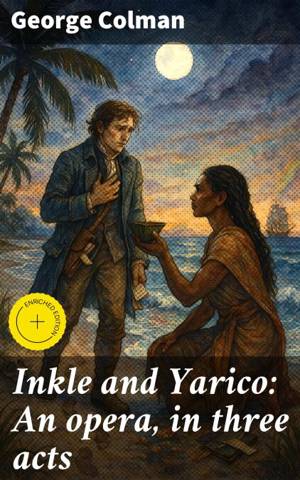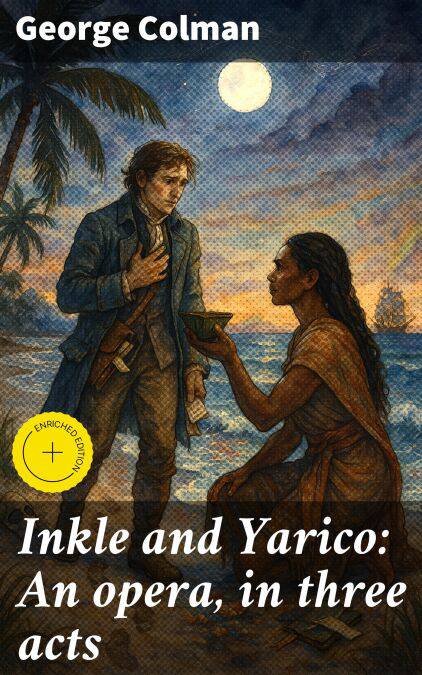
Bedankt voor het vertrouwen het afgelopen jaar! Om jou te bedanken bieden we GRATIS verzending (in België) aan op alles gedurende de hele maand januari.
- Afhalen na 1 uur in een winkel met voorraad
- In januari gratis thuislevering in België
- Ruim aanbod met 7 miljoen producten
Bedankt voor het vertrouwen het afgelopen jaar! Om jou te bedanken bieden we GRATIS verzending (in België) aan op alles gedurende de hele maand januari.
- Afhalen na 1 uur in een winkel met voorraad
- In januari gratis thuislevering in België
- Ruim aanbod met 7 miljoen producten
Zoeken
Inkle and Yarico: An opera, in three acts E-BOOK
Enriched edition. Love, Betrayal, and Redemption: A Tale of 18th-Century Opera Brilliance
George Colman
E-book | Engels
€ 0,49
Omschrijving
George Colman's 'Inkle and Yarico: An Opera, in Three Acts' is a captivating adaptation of the enduring themes of love and cultural encounter, intricately woven into the fabric of 18th-century literary context. With its roots in the rich tradition of English ballad opera, Colman's work combines whimsical lyricism and poignant dialogue, mirroring the burgeoning sensibilities of the Enlightenment era. The narrative centers around the tumultuous relationship between the Englishman Inkle and the indigenous Caribbean woman Yarico, reflecting the complex dynamics of colonialism and personal agency while balancing entertainment with deep social commentary. Colman, known for his sharp wit and keen observations of society, was influenced by the changing tides of British imperialism and the increasing fascination with the 'exotic' cultures abroad. His experiences in the theater and his collaborations with prominent contemporaries contributed to his understanding of the medium and its potential for exploring nuanced social themes. Through 'Inkle and Yarico,' Colman invites audiences to reconsider the moral ambiguities of colonization and the human cost embedded within these narratives. This opera is a must-read for those interested in the intersections of gender, race, and colonial discourse. Colman's lyrical talent and insightful characterizations make it a compelling exploration of love and sacrifice, recommending it to scholars, students, and practitioners of theatrical arts who seek to engage with the complex dialogues of identity and power that resonate to this day.
In this enriched edition, we have carefully created added value for your reading experience:
- A succinct Introduction situates the work's timeless appeal and themes.
- The Synopsis outlines the central plot, highlighting key developments without spoiling critical twists.
- A detailed Historical Context immerses you in the era's events and influences that shaped the writing.
- A thorough Analysis dissects symbols, motifs, and character arcs to unearth underlying meanings.
- Reflection questions prompt you to engage personally with the work's messages, connecting them to modern life.
- Hand‐picked Memorable Quotes shine a spotlight on moments of literary brilliance.
- Interactive footnotes clarify unusual references, historical allusions, and archaic phrases for an effortless, more informed read.
In this enriched edition, we have carefully created added value for your reading experience:
- A succinct Introduction situates the work's timeless appeal and themes.
- The Synopsis outlines the central plot, highlighting key developments without spoiling critical twists.
- A detailed Historical Context immerses you in the era's events and influences that shaped the writing.
- A thorough Analysis dissects symbols, motifs, and character arcs to unearth underlying meanings.
- Reflection questions prompt you to engage personally with the work's messages, connecting them to modern life.
- Hand‐picked Memorable Quotes shine a spotlight on moments of literary brilliance.
- Interactive footnotes clarify unusual references, historical allusions, and archaic phrases for an effortless, more informed read.
Specificaties
Betrokkenen
- Auteur(s):
- Uitgeverij:
Inhoud
- Aantal bladzijden:
- 138
- Taal:
- Engels
Eigenschappen
- Productcode (EAN):
- 4057664563491
- Verschijningsdatum:
- 3/12/2019
- Uitvoering:
- E-book
- Beveiligd met:
- Digital watermarking
- Formaat:
- ePub

Alleen bij Standaard Boekhandel
Beoordelingen
We publiceren alleen reviews die voldoen aan de voorwaarden voor reviews. Bekijk onze voorwaarden voor reviews.









